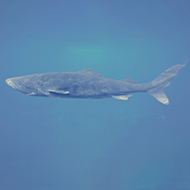
A post-mortem revealed discolouration and cloudy fluid around the brain.
A rare shark found stranded on a beach in Cornwall had meningitis, scientists have confirmed, in what is considered to be the first account of the disease in the species.
The female Greenland shark was temporarily stranded outside Newlyn Harbour in March and is thought to have lived to around 100 years old.
Researchers say the discovery explains why the shark was out of her natural deep-water habitat, but stress there is not enough evidence to connect the death with any human impacts on the oceans.
“During the post-mortem examination, the brain did look slightly discoloured and congested and the fluid around the brain was cloudy, raising the possibility of infection,” commented James Barnett, a veterinary pathologist from the Cornwall Marine Pathology team. “This was then confirmed on microscopic examination of the brain (histopathology). A species of Pasteurella, a bacteria, was isolated from the fluid and this may well have been the cause of the meningitis.
He continued: “The shark’s body was in poor condition and there were signs of haemorrhage within the soft tissue around the pectoral fins which, coupled with the silt found in her stomach, suggested she may well have live stranded. As far as we’re aware, this is one of the first post-mortem examinations here in the UK of a Greenland shark and the first account of meningitis in this species.”
The post-mortem formed part of ZSL’s Cetacean Stranding Investigate Programme (CSIP), which coordinates the investigation of all cetaceans, marine turtles and basking sharks that strand around the UK coastline.
Rob Deaville, CSIP project lead, said: “This unfortunate and extraordinary stranding has allowed us to get an insight into the life and death of a species we know little about. Discovering that this shark had meningitis is likely a world’s first, but the significance of this in terms of any wider stressors is unknown.
“Ultimately, like most marine life, deep-sea species such as Greenland sharks may also be impacted by human pressures on the ocean but there is not enough evidence at this stage to make any connections.”
Greenland sharks reside in the deep waters of the Arctic and North Atlantic oceans up to 2,647 meters below the surface. The species is considered to be very mysterious, with some individuals described as having the potential to live to over 400 years old.
The team is expected to publish a paper further detailing their findings in due course.



 HMRC has invited feedback to its communications regarding the employment status of locum vets and vet nurses.
HMRC has invited feedback to its communications regarding the employment status of locum vets and vet nurses.